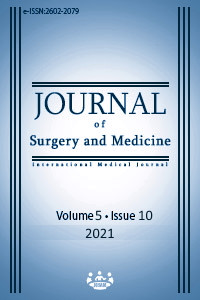The link between serum ACKR2 level and Crohn's Disease and its activity
Keywords:
ACKR2, Chemokine, Crohn’s disease, InflammationAbstract
Backgrounds/Aim: Atypical chemokine receptor (ACKR) family suppresses chemokine response and keeps the inflammatory state under control. This study investigated ACKR2 serum levels, which are thought to have an effect on the extreme inflammatory state in Crohn's disease (CD). Methods: Active and newly diagnosed Crohn's patients under treatment and a healthy control group were included in this prospective case-control study. Patients under the age of 18 years and those with Crohn's disease in remission were excluded. Clinical, demographic, laboratory parameters and serum ACKR2 levels of the patients were examined. Disease activity was evaluated using the simplified endoscopic score for Crohn’s disease (SES-CD) and Crohn’s disease activity index (CDAI) index. The relationship between disease activity and serum ACKR2 was evaluated using the Spearman correlation analysis. Results: A total of 119 subjects (66 CD patients and 53 healthy controls) were included in the study. Serum ACKR2 level was significantly lower in the CD group (4.80 ng/mL) compared to the control group (11.15 ng/mL) (P<0.001). In the correlation analysis between ACKR2 level and disease activity indicators, there was a weak positive correlation with SES-CD and CDAI (r = 0.350 P=0.004, r = 0.252, P=0.041, respectively). Conclusion: Our data show that the ACKR2 level in active CD is quite low compared to the control group. Despite the increase in disease activity, it is not upregulated at a sufficient level and may have adverse effects on the progression of the disease.
Downloads
References
Bachelerie F, Ben-Baruch A, Burkhardt AM, Combadiere C, Farber JM, Graham GJ, et al. International Union of Pharmacology. LXXXIX. Update on the extended family of chemokine receptors and introducing a new nomenclature for atypical chemokine receptors. Pharmacol Rev. 2013 Nov 11;66(1):1-79. doi: 10.1124/pr.113.007724.
Mantovani A. Cytokines and their receptors. In: Ratcliffe MJH, editor. Encyclopedia of Immunobiology. Amsterdam: Elsevier; 2016. p. 438-604.
Johnston B, Butcher EC. Chemokines in rapid leukocyte adhesion triggering and migration. Semin Immunol. 2002 Apr;14(2):83-92. doi: 10.1006/smim.2001.0345.
Balkwill F. Cancer and the chemokine network. Nat Rev Cancer. 2004 Jul;4(7):540-50. doi: 10.1038/nrc1388.
Graham GJ, Locati M, Mantovani A, Rot A, Thelen M. The biochemistry and biology of the atypical chemokine receptors. Immunol Lett. 2012 Jul 30;145(1-2):30-8. doi: 10.1016/j.imlet.2012.04.004.
Nibbs RJ, Graham GJ. Immune regulation by atypical chemokine receptors. Nat Rev Immunol. 2013 Nov;13(11):815-29. doi: 10.1038/nri3544.
Lee KM, Danuser R, Stein JV, Graham D, Nibbs RJ, Graham GJ. The chemokine receptors ACKR2 and CCR2 reciprocally regulate lymphatic vessel density. EMBO J. 2014 Nov 3;33(21):2564-80. doi: 10.15252/embj.201488887.
Graham GJ, Locati M. Regulation of the immune and inflammatory responses by the 'atypical' chemokine receptor D6. J Pathol. 2013 Jan;229(2):168-75. doi: 10.1002/path.4123.
Nibbs RJ, Kriehuber E, Ponath PD, Parent D, Qin S, Campbell JD, et al. The beta-chemokine receptor D6 is expressed by lymphatic endothelium and a subset of vascular tumors. Am J Pathol. 2001 Mar;158(3):867-77. doi: 10.1016/s0002-9440(10)64035-7.
Langenes V, Svensson H, Borjesson L, Gustavsson B, Bemark M, Sjoling A, et al. Expression of the chemokine decoy receptor D6 is decreased in colon adenocarcinomas. Cancer Immunol Immunother. 2013 Nov;62(11):1687-95. doi: 10.1007/s00262-013-1472-0.
Di Liberto D, Locati M, Caccamo N, Vecchi A, Meraviglia S, Salerno A, et al. Role of the chemokine decoy receptor D6 in balancing inflammation, immune activation, and antimicrobial resistance in Mycobacterium tuberculosis infection. J Exp Med. 2008 Sep 1;205(9):2075-84. doi: 10.1084/jem.20070608.
Shanahan F. Crohn's disease. Lancet. 2002 Jan 5;359(9300):62-9. doi: 10.1016/S0140-6736(02)07284-7.
Maaser C, Sturm A, Vavricka SR, Kucharzik T, Fiorino G, Annese V, et al. ECCO-ESGAR Guideline for Diagnostic Assessment in IBD Part 1: Initial diagnosis, monitoring of known IBD, detection of complications. J Crohns Colitis. 2019 Feb 1;13(2):144-164. doi: 10.1093/ecco-jcc/jjy113.
Satsangi J, Silverberg MS, Vermeire S, Colombel JF. The Montreal classification of inflammatory bowel disease: controversies, consensus, and implications. Gut. 2006 Jun;55(6):749-53. doi: 10.1136/gut.2005.082909.
Daperno M, D’Haens G, Van Assche G, et al. Development and validation of a new, simplified endoscopic activity score for Crohn’s disease: the SESCD. Gastrointest Endosc. 2004 Oct;60(4):505-12. doi: 10.1016/s0016-5107(04)01878-4.
Best WR, Becktel JM, Singleton JW, Kern F Jr. Development of a Crohn's disease activity index. National Cooperative Crohn's Disease Study. Gastroenterology. 1976 Mar;70(3):439-44.
Bonavita O, Mollica Poeta V, Setten E, Massara M, Bonecchi R. ACKR2: An Atypical Chemokine Receptor Regulating Lymphatic Biology. Front Immunol. 2017 Jan 11;7:691. doi: 10.3389/fimmu.2016.00691.
McKimmie CS, Singh MD, Hewit K, Lopez-Franco O, Le Brocq M, Rose-John S, et al. An analysis of the function and expression of D6 on lymphatic endothelial cells. Blood. 2013 May 2;121(18):3768-77. doi: 10.1182/blood-2012-04-425314.
Liu L, Graham GJ, Damodaran A, Hu T, Lira SA, Sasse M, et al. Cutting edge: the silent chemokine receptor D6 is required for generating T cell responses that mediate experimental autoimmune encephalomyelitis. J Immunol. 2006 Jul 1;177(1):17-21. doi: 10.4049/jimmunol.177.1.17.
Hansell CA, MacLellan LM, Oldham RS, Doonan J, Chapple KJ, Anderson EJ, et al. The atypical chemokine receptor ACKR2 suppresses Th17 responses to protein autoantigens. Immunol Cell Biol. 2015 Feb;93(2):167-76. doi: 10.1038/icb.2014.90.
Lee KM, McKimmie CS, Gilchrist DS, Pallas KJ, Nibbs RJ, Garside P, et al. D6 facilitates cellular migration, and fluid flow, to lymph nodes by suppressing lymphatic congestion. Blood. 2011 Dec 1;118(23):6220-9. doi: 10.1182/blood-2011-03-344044.
Shams K, Wilson GJ, Singh M, van den Bogaard EH, Le Brocq ML, Holmes S, et al. Spread of Psoriasiform Inflammation to Remote Tissues Is Restricted by the Atypical Chemokine Receptor ACKR2. J Invest Dermatol. 2017 Jan;137(1):85-94. doi: 10.1016/j.jid.2016.07.039.
Vetrano S, Borroni EM, Sarukhan A, Savino B, Bonecchi R, Correale C, et al. The lymphatic system controls intestinal inflammation and inflammation-as-sociated colon cancer through the chemokine decoy receptor D6. Gut. 2010 Feb;59(2):197-206. doi: 10.1136/gut.2009.183772.
Downloads
- 410 566
Published
Issue
Section
How to Cite
License
Copyright (c) 2021 Sami Çifçi, Mehmet Bayram, Kader Irak, Nergis Ekmen, Gülsen Şener, Hadi Sasani
This work is licensed under a Creative Commons Attribution-NonCommercial-NoDerivatives 4.0 International License.
















